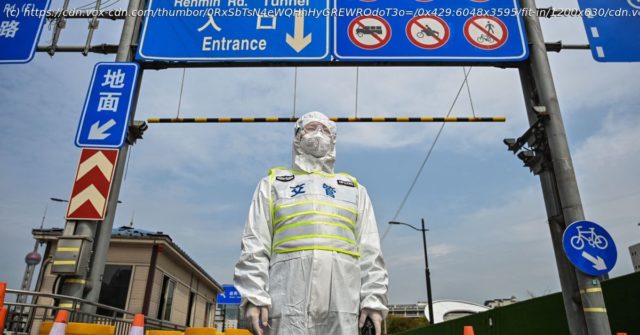Why even many wealthy people in China’s richest city can’t reliably get food — and what it says about the country’s political system.
In late March, Chinese authorities warned the residents of Shanghai that they would soon be trapped in their homes. They were given little time to prepare provisions for what they were told would be a few days trapped at home to combat the spread of Covid-19. It’s three weeks later, and China’s largest city remains in lockdown. The government has failed to provide sufficient food, leading to starving people and the emergence of a barter economy among residents. Medical care for non-Covid ailments is difficult to access, leading to reports of people dying of injuries and easily preventable diseases. Shanghaiers are furious, clashing with police and venting rage out their windows to an empty city. Robots and drones patrol the streets and the skies, sending eerie messages instructing citizens to remain calm and “control your soul’s desire for freedom.” On top of all of that, it’s not exactly clear how much Covid-19 spread and death the most extreme measures have actually prevented. (Official reports claim there have been 400,000 cases in the city of 28 million.) How could this happen to a city as wealthy and cosmopolitan as Shanghai? And what does the situation tell us about the Chinese political system? To answer these questions, I reached out to Mark Frazier, a professor at the New School who studies urban politics in Shanghai and China more broadly. According to Frazier, the situation in Shanghai reflects a government dogmatically committed to its “zero Covid” policy — of preventing any community spread of the coronavirus — even as the contagiousness of the omicron variant renders the policy basically infeasible. The commitment reflects deep flaws in the Chinese response to the pandemic, ranging from a failure to push a mass vaccination campaign to an ideological commitment to proving that China’s autocracy “works” better than liberal democracy. Yet at the same time, Frazier cautions against assuming that the scenes on display in Shanghai will galvanize a mass protest movement against the Communist Party — something that observers outside China predict far more than it actually happens. A transcript of our conversation follows, edited for length and clarity. There’s this article in the American Prospect by an anonymous journalist in Shanghai. And it starts with this: How did we get to that point — even in a China that I think is fairly described as totalitarian in a lot of respects — where the government has increased its control over citizens in its wealthiest city to such a remarkable extent? Whether we call it to totalitarian or hard authoritarian, the tools are in place to keep people surveilled, and indeed even locked down, or to track their movements if they’re trying to transgress the quarantine or lockdown requirements. I think the bigger surprise is the lack of basic provisions. Food scarcity in China’s wealthiest city is something that is indeed puzzling and shocking. Even two months ago, you would’ve never believed someone who told you that 25 million people in Shanghai would be running around looking for food on a daily basis. There’s two things going on, it seems. One is the zero Covid policy itself and the authoritarian way in which China has designed it. The other is the failures of certain elements of the implementation — access to food and medical treatment for non-Covid ailments, for example. One question I have is whether those two things can be disentangled. To what extent was there a better version available of the zero Covid policy — one that was just bungled terribly in Shanghai? And to what extent are the failures on display there intrinsic to the idea of exerting incredibly harsh control over citizens in the name of stopping the spread of Covid? I think that’s a really good question. If you think about the Chinese government going back to even Wuhan in early 2020, [it was] clearly locked into a zero Covid strategy. Six months ago, and even more recently, you would’ve said “this worked for China.” Once you adopt that [thinking], then you downplay the need to get vaccines to the vulnerable populations, especially the elderly. You live with a homegrown vaccine that is clearly not performing as well as foreign-made vaccines. And it’s not as though you can change railroad tracks that quickly and go to a living-with-Covid type of strategy that you see elsewhere in the world, because you have this vast vulnerable population who haven’t even received the vaccine in many cases. At the same time, you could have given people more [advance] warning to go out and provision themselves. That’s been one of the biggest complaints: that people didn’t have any time to really prepare for this. And they were told, at first, that this is just going to be a four-day lockdown. And now you’re in an extended lockdown. All the emergency room horror stories where people who really need to get medical treatment unrelated to Covid are being turned away or postponed — and in some cases dying.






